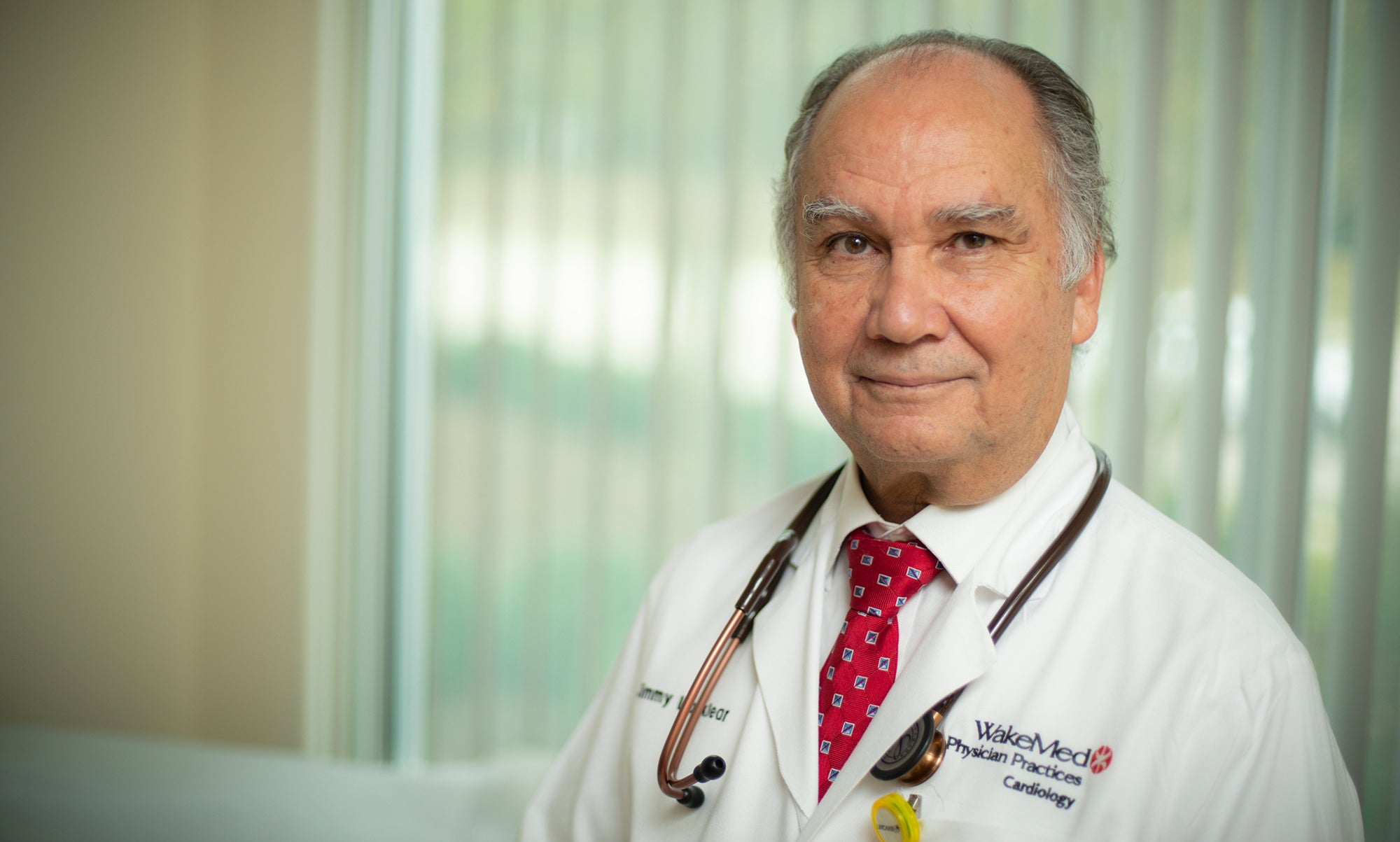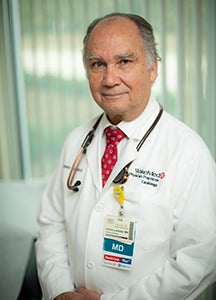A Legacy of Heartfelt Care: Dr Jimmy Locklear's Dedicated Service Through the Years
December 7, 2023
Categories: Stories, Heart & Vascular, Raleigh Campus
Jimmy Locklear, MD, FACC, launched his medical career in 1985 and has since been a beacon for compassionate patient care. Board certified in internal medicine and cardiovascular diseases, Dr. Locklear has been a part of the Medical Staff at WakeMed his entire career. He joined WakeMed Heart & Vascular full-time after more than two decades with Wake Heart Associates and Raleigh Internal Medicine.
A multi-time winner of the Excellence in Healthcare Award from Professional Research Consultants (PRC), Dr. Locklear has collaborated with his colleagues to improve cardiovascular outcomes — through years of incredible medical advancements and research. Navigating the breadth and depth of 39 years of innovation, Dr. Locklear is proud of WakeMed’s ongoing commitment to delivering the highest quality patient care.
Decades of Cardiovascular Care
“I could write a book on the cutting-edge changes seen in cardiovascular care. One standout is the treatment of patients with heart attacks. With the evolution of performing percutaneous coronary interventions (PCIs), which is an angioplasty procedure, we placed the first bare-metal stent in 1992.
“In 2003, we upgraded bare metal stents to drug-eluting stents to prevent stent failure, narrowing of the artery with scar tissue and the formation of blood clots in stents.”
Dr. Locklear also has the distinction of being the first cardiologist to perform a PCI at WakeMed Cary Hospital, which took place in 2019.
“I’m proud of that distinction. Even better, the patient on whom I performed the procedure is still doing well.”
An additional win in the care of heart attack patients during Dr. Locklear’s tenure was the fast-acting transition of patients to the cardiac catheterization lab.
“We determined that to save time and heart muscle, we should take patients presenting with a heart attack directly to the cardiac catheterization lab. This is standard care at WakeMed today but something we had not done previously. We also learned that we could open up coronary arteries with balloons after a heart attack, sharply improving survival rates.”
Dr. Locklear was on the cusp of knowledge in morbidity prevention for patients with congestive heart failure and arrhythmias. Over the years, medical management of heart failure patients has vastly improved survival and quality of life. Additionally, he recalls the dramatic improvements seen in the treatment of atrial fibrillation.
“Back in the day, there were only a couple of anti-arrhythmic drugs that could be used to treat this condition. Now there are numerous options. Today, we send these patients to electrophysiologists to determine the best treatments, which could include radio frequency ablation. For these reasons, we are seeing relatively high cure rates.”
Dr. Locklear was present when WakeMed began using implantable defibrillators to help cardiac patients.
“In the early days, only academic hospitals had defibrillators. In 1986, I remember sending my patient to a different hospital for defibrillator treatment to restore a normal heartbeat. That is now a routine aspect of our care.”
The treatment of stroke patients has also seen significant medical advancements over Dr. Locklear’s year of service.
“I am pleased with the improvements in stroke care with incorporation of thrombolytics and alteplase and, now at WakeMed, the use of tenecteplase,” shares Dr. Locklear. “This treatment has helped to prevent morbidity from stroke as well as preserve brain function.
“In a subset of stroke patients, catheter-based interventions to open occluded and narrowed cerebral arteries with balloons and stents are being used.”
Dr. Locklear has seen growth in treating patients with peripheral artery disease (PAD).
“I’ve been present for improved pain treatment and management of PAD. Many years ago, patients with PAD were more likely to receive bypass grafting, which was critical but potentially carried more risks. Now, we can use balloons with stents for safer vascular care.
“In addition, interventions in arteries below the knees in patients with critical limb ischemia has decreased limb amputations.”
WakeMed Heart Center
The expansion of specialized care for heart patients was an especially memorable time for Dr. Locklear.
“I was here in 1998 when we opened the WakeMed Heart Center. We used to have a small area by the emergency department for treating cardiology patients, along with the catheterization labs, which were in the Medical Office Building. Now with the WakeMed Heart Center facility, we have vastly expanded space for cardiovascular care.
“I’ve seen so much of our growth and have happily moved with the times to stay current on new procedures and new devices as we have always been committed at WakeMed to improving patient care.”
Origins of a Compassionate Heart
Dr. Locklear cares deeply for all patients, but he has a special place in his heart for the disenfranchised since he, too, came from humble beginnings. He grew up in Robeson County, the third poorest county in North Carolina and home to the Lumbee tribe, of whom Dr. Locklear is a member. He is proud that his Native American roots make him part of the largest tribe east of the Mississippi.
“We were poor, but we were proud. We wore clean clothes. We had food on the table. However, we didn’t have running water, a gas or electric stove or inside toilets. When I was in tenth grade, my dad received a federal government loan for $10,000 to build a home for us. For the first time, we had an indoor bathroom and running water. Our wood stove was also replaced with a gas stove. I thought we were the Beverly Hillbillies,” Dr. Locklear laughs. “My older sister was the first in our family to go to college. She became a teacher, and she served as a role model for the remaining siblings. I can relate to and empathize with people who don’t have much money because I grew up very humble.”
Tearing up, Dr. Locklear adds, “That’s why retiring is hard. I’m leaving my patients. We’ve shed many tears and shared many hugs because they know I really care about them. Good medicine isn’t simply about treatment. At times, I’ve just sat quietly with patients and held their hand. That’s worth a lot.”
Memorable Patient Experiences
Dr. Locklear has many special memories of his patients and recalls a patient for whom he believes his team offered care that went above and beyond.
“I had an appointment with a patient with congestive heart failure who was doing very poorly. Upon looking at his chart, I saw that he was prescribed a medication that should have improved his symptoms. When I asked him about taking the medication, I found out he wasn’t taking it because he couldn’t afford the copay. On a fixed income, he could not stretch his finances to cover this cost. At his income level, he qualified for patient assistance, but he couldn’t fill out the application because he was unable to read or write. My nurse filled out the forms for him and mailed it to the drug company. To this day, he receives his refill delivered to his home every 90 days, and all that’s needed is to reapply annually. When I saw him again, it was clear the medication was making a big difference in the way he felt. He hugged my nurse. It was beautiful and heartbreaking to know he had suffered so long without his meds.”
Dr. Locklear recalls exceptional care even during natural disasters. In 1996, a major “nor’easter” paralyzed the Eastern Seaboard for the better part of a week, which included an ice storm in the Raleigh area, making it challenging for emergency medical services (EMS) to safely transport patients to the hospital.
“During that storm due to the weather, a patient having a heart attack was taken to a hospital without a cardiac catheterization lab. That team gave him thrombolitic therapy which restored blood flow through the occluded artery to preserve his life until he could be transferred. He was transferred the next day, and I took him to the cath lab for angioplasty to the “widow-maker” coronary artery. With treatment and continued follow-up care, he did remarkably well. Today, he is in his 80s and is still going strong. When I told him I’m retiring, he teared up and thanked me for taking care of him all these years. He’s just one patient among many of whom I’ve had the opportunity to build a relationship. I’ll miss these relationships the most.”
Plans for Retirement
Looking into the future, Dr. Locklear is eager to indulge in the simple pleasures of life.
“I’m going to read something other than medical journals. I’m ready to read all kinds of good books. Also, we have a son, daughter-in-law and four grandchildren in Nashville, Tennessee. We plan to visit them more often. And, we have a little house in Blowing Rock. We absolutely love the mountains, so we expect more spur of the moment trips there.”
Words of Wisdom for His Medical Colleagues
Upon parting, Dr. Locklear takes with him nearly four decades of knowledge and wisdom. As a gift to his colleagues, especially those new to the profession, he offers these final words.
“I’m going to miss working with so many talented providers at WakeMed. They are exceptional, so my advice for them is simple — but with great impact.”
- Look patients in the eye when they tell you about their symptoms. It can be tough, but try to be intentional about spending more time looking at the patient rather than the computer screen where their chart information is listed.
- Treat patients as if they were your own family.
- Explain the treatment and make sure they understand the information.
- Make sure patients can afford the medications you prescribe. There are so many wonderful drugs in cardiology, but they are expensive. If patients can’t afford them, they won’t take them.
- At the end of every visit, ask patients if they have any questions?
“If you do these things, you’re going to be a fantastic doctor.”
About Jimmy Locklear, MD, FACC
 Dr. Jimmy Locklear is board-certified in internal medicine and cardiovascular diseases, and joined WakeMed Heart & Vascular after more than a decade of experience with Wake Heart Associates and Raleigh Internal Medicine.
Dr. Jimmy Locklear is board-certified in internal medicine and cardiovascular diseases, and joined WakeMed Heart & Vascular after more than a decade of experience with Wake Heart Associates and Raleigh Internal Medicine.
He earned his medical degree at the University of North Carolina School of Medicine and completed his internship and residency in internal medicine at the Indiana University School of Medicine and fellowship in cardiovascular diseases at Loyola University Stritch School of Medicine. He also has a Bachelor of Science degree in chemical engineering from North Carolina State University.
Dr. Locklear is a fellow of the American College of Cardiology and a member of the College’s North Carolina chapter. He has served as a physician volunteer with the Open Door Clinic at Urban Ministries in Raleigh.